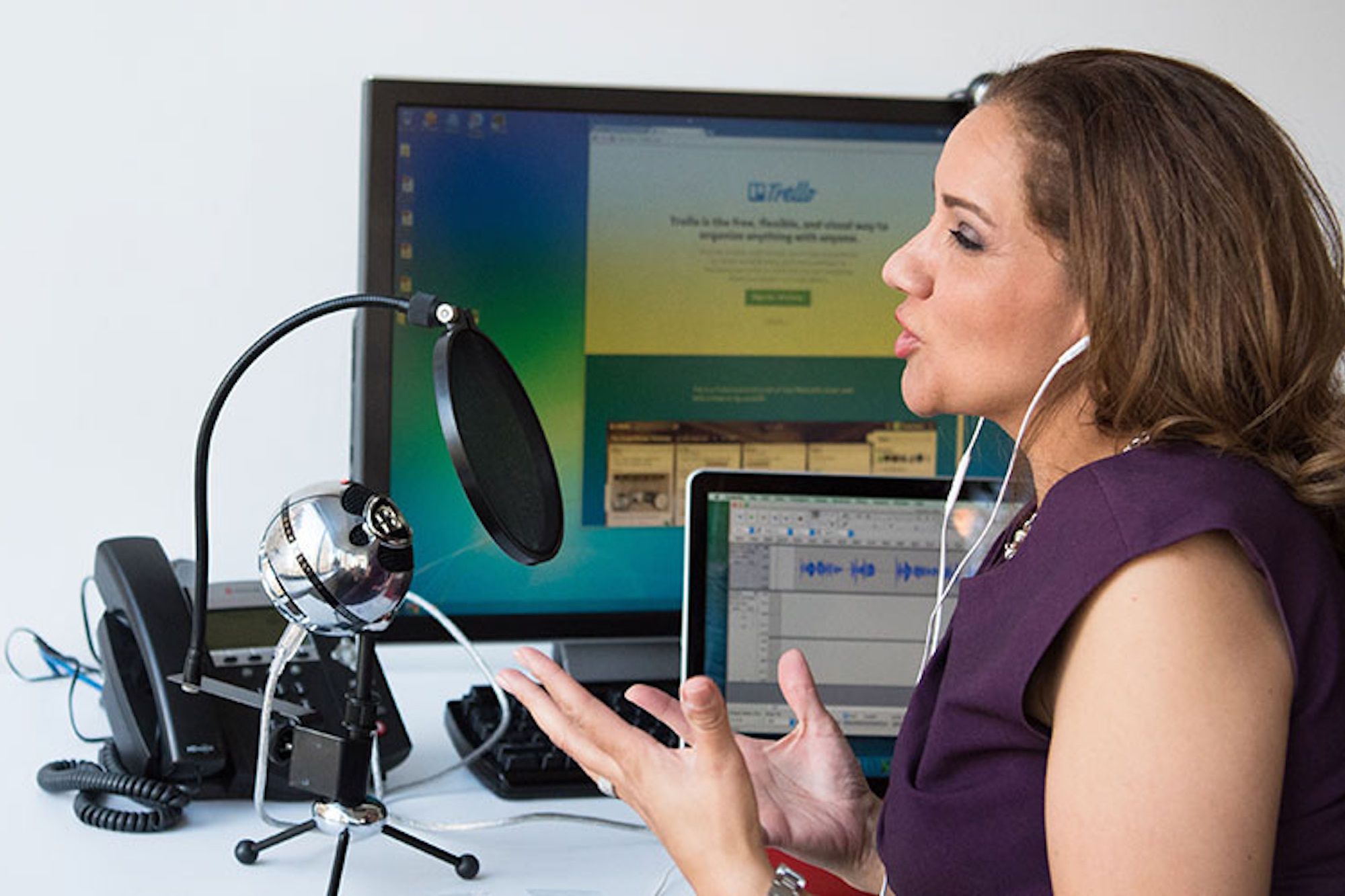Home>Events & Info>Podcast>How Many Podcast Downloads Is Good


Podcast
How Many Podcast Downloads Is Good
Modified: January 22, 2024
Learn how to determine the ideal number of podcast downloads for success. Discover the key factors that indicate a good number of downloads for your podcast
(Many of the links in this article redirect to a specific reviewed product. Your purchase of these products through affiliate links helps to generate commission for AudioLover.com, at no extra cost. Learn more)
Table of Contents
Introduction
Welcome to the exciting world of podcasts! In recent years, podcasts have exploded in popularity, offering a unique and engaging way to consume content. Whether you’re a podcast listener or a content creator, understanding podcast downloads is crucial in evaluating the success and reach of a podcast.
Podcast downloads refer to the number of times a podcast episode has been downloaded or streamed by listeners. It serves as a key metric to measure the audience size and engagement with a podcast. While podcast downloads are a valuable indicator, it’s important to remember that they don’t provide a complete picture of a podcast’s success.
In this article, we will delve into the world of podcast downloads and explore factors to consider when assessing download numbers. We will also discuss industry standards, benchmarks, and setting appropriate goals for podcast downloads. So, whether you’re a podcast creator aiming for growth or a curious listener seeking insights, this article will serve as your guide.
Understanding Podcast Downloads
Before we dive into the intricacies of podcast downloads, it’s essential to grasp the basics. A podcast download occurs when a listener retrieves an episode file from a podcast hosting platform onto their device. This allows them to listen to the episode offline or stream it directly. The download metric helps creators and advertisers gauge the popularity and reach of a podcast.
It’s important to note that different podcast hosting platforms may have varying definitions of what constitutes a download. For example, some platforms may count both downloads and streams, while others may only track downloads. This discrepancy can impact download numbers, so it’s crucial to understand the methodology used by your hosting platform.
Podcast downloads can be further categorized into unique downloads and total downloads. Unique downloads represent the number of distinct listeners who have accessed the episode, while total downloads encompass all downloads, including multiple downloads from the same individual. Both metrics offer valuable insights into audience engagement.
Additionally, it’s worth mentioning that podcast downloads are not real-time data. It may take a few hours or even days for the download numbers to update on hosting platforms. This delay is inherent to ensure accurate tracking and reporting.
Moreover, it’s essential to keep in mind that podcast downloads are not the sole indicator of a podcast’s success. While they provide a useful measure of audience reach, other factors like subscriber count, episode length, listener engagement, and reviews also contribute to a podcast’s overall impact.
As a podcast creator, it’s crucial to analyze download trends over time rather than fixating on individual download numbers. By tracking patterns, you can gain insights into which episodes resonate most with your audience and tailor your content accordingly.
Now that we have a solid understanding of what podcast downloads are and their significance, let’s explore the factors to consider when evaluating download numbers in the next section.
Factors to Consider
When assessing podcast download numbers, it’s important to consider several factors that can impact the accuracy and interpretation of the data. These factors can provide valuable context and insights into the success of your podcast.
1. Platform Distribution: Different podcast platforms have varying levels of popularity and user bases. It’s essential to examine download numbers across multiple platforms to understand the overall reach of your podcast. This will give you a more comprehensive view of your audience and help identify any platform-specific trends.
2. Episode Age: The age of an episode plays a role in its download numbers. Newly released episodes often experience a surge in downloads within the first few days, as loyal listeners catch up on the latest content. Over time, the download numbers may stabilize or decrease. Therefore, it’s essential to track the performance of episodes over their lifespan to get a clearer picture of their impact.
3. Promotion and Marketing: The success of your podcast can be influenced by your promotion and marketing efforts. If you actively promote new episodes on social media, newsletters, or other channels, you may see a boost in download numbers. Similarly, collaborations with other podcasts or guest appearances can attract new listeners and increase downloads. It’s important to assess the impact of your promotional activities when evaluating download numbers.
4. Episode Topic and Guest Selection: Another factor that can influence download numbers is the topic of your episodes and the guests you feature. Certain topics may resonate more with listeners, resulting in higher download numbers. Similarly, well-known or influential guests can attract a larger audience and increase downloads. Analyzing the performance of different episode topics and guest appearances can provide valuable insights for your future content planning.
5. Seasonality and Trends: Podcast download numbers can also be affected by seasonal trends or specific events. For example, a podcast about holiday recipes may experience higher downloads during the festive season. Stay aware of any external factors that may influence download numbers, as it can help you interpret the data in a more informed manner.
Remember, while download numbers are a vital metric, they should be analyzed in conjunction with other performance indicators, such as listener engagement, reviews, and subscriber growth. By considering these factors, you can gain a more comprehensive understanding of your podcast’s success and make informed decisions to improve its reach and impact.
Industry Standards and Benchmarks
When evaluating podcast download numbers, it can be helpful to have benchmarks and industry standards for comparison. While there is no one-size-fits-all benchmark, understanding general trends and averages can provide valuable context for assessing the success of your podcast.
It’s important to note that industry standards and benchmarks can vary depending on factors such as podcast genre, niche, target audience, and the overall podcast landscape. However, here are a few general guidelines to consider:
1. Average Downloads per Episode: According to industry data, podcasts typically receive around 2,000 to 3,000 downloads per episode within the first 30 days. However, this number can vary significantly depending on factors like podcast niche, audience size, and promotion efforts. It’s essential to analyze your podcast’s performance relative to its specific category and audience base.
2. Ranking on Podcast Platforms: Another useful benchmark is the ranking of your podcast on podcast platforms like Apple Podcasts, Spotify, or Google Podcasts. A higher ranking indicates higher visibility and potentially more downloads. You can gauge your podcast’s relative performance by comparing your ranking with similar podcasts in your genre or category.
3. Listener Engagement: Download numbers alone don’t provide a complete picture of listener engagement. Monitoring other metrics such as listener feedback, reviews, social media interactions, and subscriber growth can give you a better understanding of how your audience is connecting with your content. These engagement metrics can be equally valuable in evaluating the success and impact of your podcast.
4. Industry Research and Reports: Keeping up with industry research and reports can help you stay informed about trends, benchmarks, and best practices. Organizations like Edison Research and Podcasting Insights regularly publish insightful reports on podcasting statistics and trends, providing benchmarks that you can benchmark against.
It’s important to remember that benchmarks are just guidelines and should be used as a reference rather than a strict measure of success. Ultimately, the success of your podcast should be evaluated based on your specific goals, target audience, and the impact it has on your listeners.
By understanding industry standards and incorporating benchmark analysis into your podcast evaluation, you can gain valuable insights and make informed decisions to improve your podcast’s impact and growth.
Setting Goals for Podcast Downloads
Setting goals for podcast downloads is a crucial step in measuring the success and growth of your podcast. These goals will serve as benchmarks to strive for and track your progress over time. However, it’s essential to set realistic and attainable goals that align with your podcast’s niche, target audience, and overall objectives.
Here are some key considerations when setting goals for podcast downloads:
1. Analyze Current Performance: Before setting goals, assess your podcast’s current download numbers and trends. Analyze the average number of downloads per episode, the growth rate over time, and any seasonal variations. This evaluation will help you set realistic goals based on your podcast’s unique circumstances.
2. Understand Your Audience: Consider your target audience when setting download goals. Are you aiming to reach a niche group of highly engaged listeners, or are you targeting a broader audience? Understanding your audience’s size and engagement level will help you set appropriate goals that align with their interests and expectations.
3. Consider Growth Patterns: Take into account the growth patterns of similar podcasts in your niche. Research how other successful podcasts have progressed in terms of download numbers over time. While your podcast’s growth will be unique, having industry insights can help you set achievable goals and anticipate possible milestones.
4. Break Down Goals: Instead of setting a single overarching goal, break it down into smaller milestones. For example, aim for a certain percentage increase in downloads per month or set goals for specific episodes or seasons. Breaking down your goals will make them more manageable and allow for regular evaluation and adjustments.
5. Align with Overall Objectives: Consider how podcast downloads align with your overall podcasting objectives. Are you primarily focused on monetization through sponsorships, building a loyal community, or using the podcast as a platform for other ventures? Align your download goals with these objectives to ensure they contribute to your overall podcast strategy.
6. Track and Adjust: Once you’ve set your goals, regularly monitor and track your podcast’s download performance. Use analytics tools provided by your podcast hosting platform to gain insights into listener behavior and adjust your strategies accordingly. If you find that your goals are consistently unattainable or too easily achieved, make adjustments to ensure they remain challenging but achievable.
Remember, setting goals for podcast downloads is not a one-time task. It’s an iterative process that requires continuous evaluation and adjustment. Being flexible and adaptable to changes in the podcasting landscape will allow you to set meaningful goals and drive the growth and success of your podcast.
Evaluating Success
Evaluating the success of your podcast goes beyond looking solely at download numbers. While download metrics provide valuable insights, they are just one piece of the puzzle. Here are some key factors to consider when evaluating the overall success of your podcast:
1. Listener Engagement: Assessing the engagement level of your listeners is crucial in measuring success. Look beyond download numbers and analyze how your audience interacts with your content. Pay attention to metrics such as listener feedback, comments, social media interactions, and reviews. High levels of engagement indicate that your podcast is resonating with your audience and building a loyal community.
2. Subscribers and Followers: Keep a close eye on your subscriber count and followers across various platforms. These metrics demonstrate the growth of your podcast’s audience base and can indicate the level of interest in your content. A steadily increasing subscriber count signifies a growing fanbase and the potential for greater reach and impact.
3. Quality of Content: Success should also be evaluated through the lens of the quality and impact of your podcast’s content. Consider the value and relevance of your episodes, the clarity of your messaging, and the ability to deliver meaningful insights or entertainment to your audience. If your podcast consistently delivers high-quality content that meets the needs and interests of your target audience, it can be considered a success, regardless of download numbers.
4. Monetization Opportunities: For podcasts aiming to generate revenue, assessing monetization opportunities is essential. This includes evaluating the effectiveness of sponsorships, advertising revenue, merchandise sales, or crowdfunding campaigns. If your podcast attracts advertisers, generates revenue, and provides sustainable monetization options, it can be seen as a successful endeavor.
5. Impact and Reach: Consider the broader impact and reach of your podcast beyond download numbers. Has your podcast attracted media attention or received mentions in industry publications? Are you invited to speak at events or participate in collaborations? Assessing the influence and visibility your podcast has garnered within your niche or target audience can be a key indicator of success.
6. Personal Fulfillment and Achieving Goals: Lastly, evaluate your level of personal fulfillment and whether you have achieved the goals you set for your podcast. Success can also be measured by the satisfaction you derive from creating and delivering your podcast, as well as accomplishing the objectives you had in mind when you started your podcasting journey.
Remember, measuring success is subjective and can vary from one podcast to another. It’s important to define your own metrics of success based on your podcast’s unique goals, target audience, and overall vision. By taking a holistic approach to evaluation and considering a range of factors, you can gain a comprehensive understanding of the success and impact of your podcast.
Conclusion
In conclusion, understanding podcast downloads is key to evaluating the success of your podcast. While download numbers provide valuable insights into audience reach and engagement, they should not be the sole metric of measurement. It’s important to consider a range of factors including listener engagement, subscriber growth, content quality, monetization opportunities, and overall impact to get a comprehensive understanding of your podcast’s success.
When setting goals for podcast downloads, ensure they are realistic, aligned with your podcast’s objectives, and broken down into achievable milestones. Regularly track and analyze your podcast’s performance, making adjustments as necessary to optimize growth and engagement.
Industry standards and benchmarks offer valuable context, but it’s crucial to assess your podcast’s performance within its specific niche and target audience. Remember, success can vary from one podcast to another, so it’s essential to define your own metrics of success based on your unique goals and vision.
Ultimately, evaluating the success of your podcast goes beyond download numbers. It’s about creating meaningful content, building a loyal community, and making a positive impact. By consistently delivering high-quality episodes, engaging with your audience, and adapting to the evolving podcasting landscape, you can achieve long-term success and fulfillment in your podcasting journey.
So, whether you’re a podcast creator aiming to grow your audience or a listener seeking insights into the world of podcasts, understanding and evaluating podcast downloads is crucial in your podcasting endeavors. Embrace the journey, continually learn and improve, and enjoy the incredible world of podcasts.











